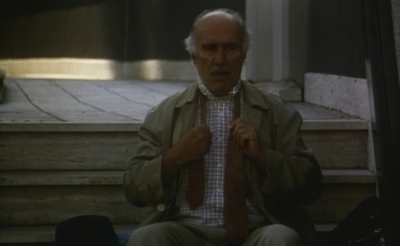
Traveling Companion begins with a wonderful opening shot showing Professor Giusti sit down and go through a number of items he carries with him, including this tie which comes into play later on.
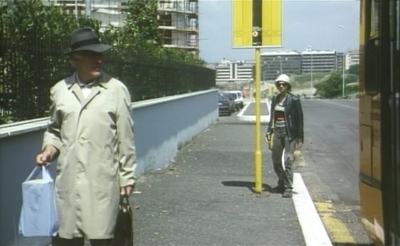
Unfortuantely, this single frame doesn’t do the scene justice. You really have to see it in motion with Cora failing miserably to remain inconspicuous as she follows Cosimo only to pretend to walk away then to follow again as he wanders aimlessly.
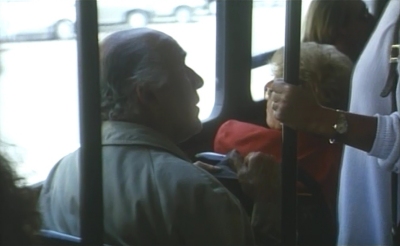
One reason the professor is so likeable is his old fashioned sense of manners and politeness. Here he cheerfully gives up his seat like a gentleman to the woman standing in the aisle.
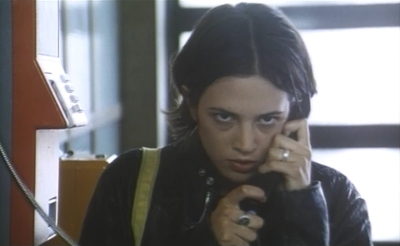
Cora’s reactions are just pricess. I love the look on her face and little details in her body language like how she clutches the phone.
She’s just funny when she’s mad.
Review by Jay Wilson Traveling Companion is an interesting study of two characters whose negative traits, instead of stacking up and damning the movie, actually makes the other more interesting—even sympathetic. Asia Argento plays a selfish and shameless mean spirited bitch named Cora, and Michel Piccoli plays the stubborn professor Cosimo Giusti suffering from dementia. Cora is offered a job secretly following the aging professor on his morning walks to make sure he doesn’t get himself lost, and Cosimo will drive her crazy with his aimless wandering around Rome, eventually getting on a train and taking both of them all across Italy. While these two might be tolerable, even interesting, on their own, the misadventures Cosimo gets into wouldn’t be nearly as entertaining if it didn’t set off Cora, and Cora’s outbursts wouldn’t be nearly as funny except for the ridiculousness of Cosimo’s misadventures. I particularly loved Michel Piccoli’s performance. Alzheimer’s disease is akin to a slow motion freefall in that it renders the victim helpless regardless of any physical, mental, or emotional feats. Gravity can conquer any man, and at least at this point in time, so too can dementia. And Piccoli captures the heartbreak of a fiercely independence man succumbing to the pathetic state of powerlessness his illness brings. At one point, he ends up at a furniture store in a bedroom display that uncannily resembles a hotel room; so he proceeds to unpack, hanging up his coat and hat, taking off his shoes, and making himself at home. At a train station, he gets up from his bench and grabs the luggage next to him, but it doesn’t belong to him. He takes off his shoes and puts on a pair of slippers too small for his feet, and we can only imagine where he got them. But watch Piccoli closely. He’s not entirely oblivious, but he’s not entirely aware either. Habit, perhaps muscle memorization, guides his actions, but watch the expression on his face. It’s as though he hopes one of these strangely familiar routines will open a door for him and allow him to claw back the tattered remains of his mind. And it really brings out the tragedy of the poor professor; he tries so hard to get back what he’s lost and hold on to what he still has, realizing in only fleeting moments that it’s a battle he can’t win. As the film progresses, he loses the knowledge to perform tasks we’ve already seen him do, and watch the expression on Mr. Piccoli’s face. Look at the embarrassment, the shame—he didn’t lose a bit of useless trivia of a menial task ... he’s lost a part of himself. His identity. His humanity. But he tries to fight it. He tries to hold on. The battle may very well be over, and he may very well never realize it, but he tries. And that’s what makes him so endearing even as he pisses off Cora again and again, managing to disappear every time she turns her back and somehow show up again when she thinks it’s finally over. In one of the more powerful scenes, he falls asleep while writing in a notebook, and Cora, overcome with curiosity, peeks inside. First we notice it’s a children’s notebook with Power Rangers splashed all over the cover, calling into question where and how he acquired it; but then Cora reads a series of notes—reminders really—for the most basic information including his own name, where he lives, and his daughter’s name. He tries ... he can’t succeed, but the old man honestly and sincerely tries. As for Cora, humor diffuses much of her venom. Naturally following Cosimo puts her in a bad mood, and her expressions of frustration are just plain funny such as one scene where after getting them lost in the Italian countryside (again) Cosimo sits down in the foreground to rest meanwhile Cora stomps around in the background, kicking unoffending brush in a childish temper tantrum. Across the film, she has very very few sincere conversations, almost always dismissing the other person with either a bullshit answer or mocking them with a smart ass remark. Halfway through the movie, Cosimo carries around a mynah bird in an opaque basket (again, we can only speculate where he got it), and on a bus ride some inquisitive children ask him if the bird bites. “Yes,” Cora answers, “they have teeth like vampires. Vampire mynahs, they call them.” And we laugh because first, while she’s far from pleasant, she’s not really malicious either, and second, this adventure is sorta like purgatory for Cora. As long as she’s miserable, we can tolerate her attitude. And with Cosimo around, you can be sure poor Cora will pay for everything she says and does. Not five minutes after she mouths off to the kids, she and Cosimo are taking refuge from a thunderstorm in an abandoned tennis court. A thought occurs to her and she scans the ceiling with a worried look, “there aren’t any bats in here, are there?” Vampire bats, perhaps? Now where could she have gotten an idea like that? 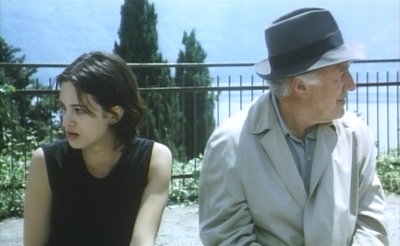
Juxtaposition is everything which is why the ancient device of sticking two very different characters together remains one of the most reliable staples of storytelling and character development.
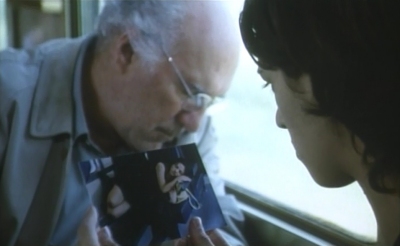
On the DVD, the note on the back of this photo stupidly did not get translated in the subtitles; however, this style of plot device should be so well known that it really doesn’t matter.
Cora, herself, has a jarring episode where she just up and leaves Cosimo, has a quickie fling with a sleazy prick businessman she literally just met, and from there she throws herself off a bridge. Now the movie does, indeed, plant the seeds of all these actions, but never sufficiently develops them. Early on, Cora dismisses men that the film doesn’t even bother to introduce but not before making clear they use her just as much as she uses them. And through a string of longing gazes and a single solitary flashback, we learn Cora’s mother leapt to her death once upon a time which haunts her to this day. But I never felt her situation escalated enough to warrant the magnitude of her third act meltdown. Walking away from the professor? Sure. I buy that. She’s stuck with him, put up with him, slowly grown to kinda like him, tried to help him, and he can’t even remember her name. We see that take its toll on her (not to mention the toll of chasing after him for days). But the spontaneous rebellious sex scene and suicide attempt? Mostly no, and definitely no. Nor do I buy that the factory workers who save her life just send her merrily on her way a few hours later. Unfortunately, the film does not always stick to Cosimo and Cora, and the further it drifts from these two, the more it loses me. Cora reports back to Ada, the daughter of Professor Giusti whom hired Cora (which is fine). But Ada has a sub-plot involving her husband whom did not get along with Cosimo which never evolves past idle conversation. Then midway through the film, Ada goes to the train station to pick up her father who, unbeknownst to her, has found a way off the train with Cora in tow. So, instead she finds her husband greeting a pregnant woman in a manner a little too friendly even for Europeans. As the two walk up the platform arm-in-arm, Ada ducks into a train which leaves the station with her in it, and that’s the last we see of them. Cora’s brother hatches a half baked kidnapping scheme which he abandons presumably because he has no way of contacting Ada whose location we don’t know and won’t know but we do know she’s not home to answer the phone. The weird thing is these side-plots, while threaded into the story earlier, still manage to feel tacked on. The pregnant girl Ada catches her husband with? Cora ran into her while waiting on Cosimo so there is a setup/payoff mechanic in play ... except it doesn’t really pay off in any meaningful way. Then again, the film is in Italian (a language I do not speak), and those were not exactly the best sub-titles I’ve ever seen. 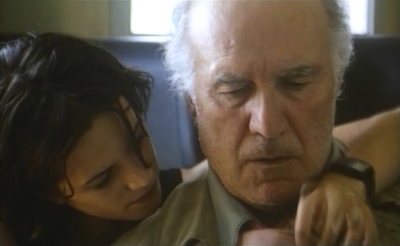
Like all well-shot movies, a single frame can convey a wealth of information, and this one shows the bond between these two characters which really is the heart of the story.
Nevertheless, the film rebounds amazingly well with Cora on her way home, and just from her silent stare we know she’s looking for her traveling companion and feels lost without him. Granted, he unwittingly dragged her to hell and back, but he was always pleasant to her, kind and caring, politely smiling and tipping his hat, even when all she had to offer was a rude comment and insult. He treated her like a human being, which was more than any of the other men in the film (including her own brother). The end of the film sees Cora sitting alone in a train station, waiting through the day and into the night, hoping the professor, whom she abandoned, would miraculously cross her path again. And then maybe, just maybe, she can redeem herself. | ||||||||||||||||||||
|
| ||||||||||||||||||||
